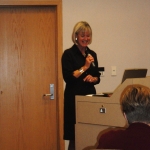Photo provided courtesy of the University of Wisconin-Madison Archives.
Altering the Face and Heart of America: the Gard Symposium
September 24-25, 2010
Lowell Conference Center, Madison, WI
Summary: The Wisconsin Arts Board was awarded funds by the National Endowment for the Arts to showcase “masterpieces” of the arts in Wisconsin. The WAB, declaring that a Wisconsin “masterpiece” is community/arts development – the simultaneous, interdependent thriving of the arts and the community partnered with the Robert E. Gard foundation to produce this symposium in honor of the 100th anniversary of Gard’s birth. Since the early 20th century, the “Wisconsin Idea” of community development has influenced life in Wisconsin, and the arts have been an important part of that development. Robert E. Gard was associated with this movement from 1945 to his death in 1992.
In 1969, he was the lead author of The Arts in the Small Community, which linked arts development to business development, wellness and health, religion and spirituality, the environment, and more, in prose so stirring that it is still quoted today…the famous last line, “If you try, you can indeed/ Alter the face and the heart of America” brought many practitioners into the community arts field. It was seminal in rural arts development for more than 50 years, and practitioners in any small community – from small town to urban neighborhood – realize its value to them.
The central idea of the Symposium was that we must learn to listen to, and understand the many languages used by community builders if the arts are to join with others in effectively creating healthy communities. Keynote speaker Lewis Feldstein – co-author with Robert Putnam of Better Together – set the tone of collaboration. In five core sessions, community-builders who are not in the arts described a healthy community from the perspective of their discipline. An artist responded to each presentation. Noted historian Dr. William Cronon offered a powerful talk on why “place” matters. And the Robert E. Gard Storytellers Circle was dedicated on Muir Knoll on the University of Wisconsin-Madison campus as a place for anyone to reflect, learn, and share ideas.
You can view the agenda for the convening here: 2010 Symposium Agenda.
The speakers-respondant pairs were:
- Lt. Governor Barbara Lawton; respondant Ra Joy, Illinois Arts Alliance/Chicago
- Dr. Jerry Hembd, Economist/UW-Superior; respondant Tom Borrup, author of the Creative Community Builder’s Handbook/Minneapolis
- Dr. Randy Stoecker, Sociologist & community technology specialist/UW Madison; respondant Mitch Menchaca, Americans for the Arts/Washington DC
- Rabbi Jonathan Biach, Temple Beth El/Madison; respondant Naj Wikoff, Creative Healing Connections, Keene, New York
- Dr. Stephanie Robert, sociologist/neighborhood health specialist/UW-Madison; respondant Roseanne Weiss, St. Louis Regional Arts Commission
Lt. Governor Barbara Lawton, Dr. Jerry Hembd, Dr. Randy Stoecker, Rabbi Jonathan Biach, Dr. Stephanie Robert
Supplementary items: Each of the five presenters wrote a short white paper. Please see below.
- Lt. Governor Barbara Lawton White Paper
- Dr. Jerry Hembd White Paper
- Dr. Randy Stoecker White Paper
- Rabbi Jonathan Biach White Paper
- Dr. Stephanie Robert White Paper
Listen to audio interviews from Rabbi Jonathan Biach:
Board Members in Action
Board members capped the Symposium by identifying certain projects that they believed captured some of Robert Gards ideas, or by participating in national conversations using Gard’s perspectives.
Click on each of the pictures above to read the mini-project details
The mini-projects were:
- Vice-President of the Gard Foundation, Jennifer Armstrong, participated in the national Rural Arts and Culture Working Group symposium
- Vice-President Doug Borwick offered workshops based around Gard’s ideas and his own writing, Building Communities, Not Audiences
- Caroline Beadle and Gerard McKenna identified a youth theater group bringing live theater to youth in suburban Chicago – many of whom were seeing theater for the first time
- Maryo Gard Ewell identified a young DJ/composer, Jackson Melnick, of Crested Butte Colorado, who sought to collect original “songs of place” and do interviews with the songwriters throughout Colorado, exploring the relationship of their songs to their homes
- Mark Lefebvre identified a southeastern Wisconsin little league team to be bringers of Wisconsin poetry to their fans
- Mitch Menchaca identified the Gay Men’s Chorus in Washington, DC, whose outreach program offered support for creative youth
- Barbara Strauss identified a theater group in Cleveland whose youth component wrote plays based on their own experience and toured them to Cleveland neighborhoods
Funding from the Wisconsin Arts Board made possible a symposium on community arts development and the arts. Funding also made possible one-time mini-grants for activities or programs embodying ideas discussed during the symposium, identified by board members.
This project was supported in part by a grant from the Wisconsin Arts Board with funds from the National Endowment for the Arts.






